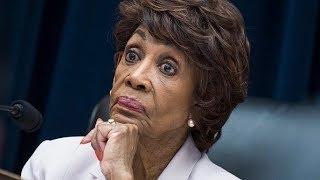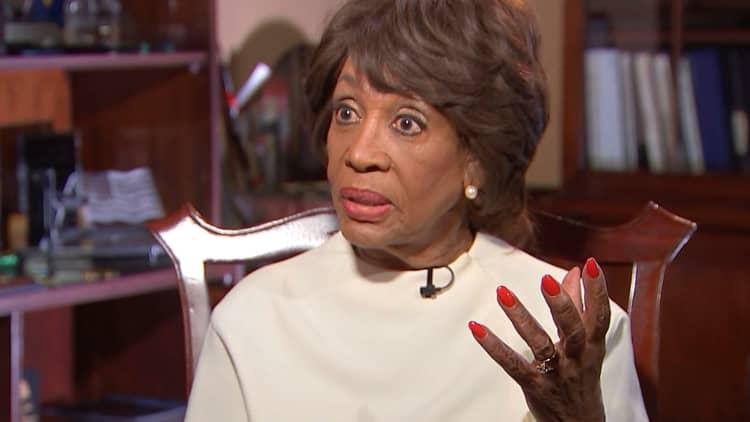Maxine Waters, the prominent California congresswoman, has found herself at the center of a political storm as she attempts to downplay the violence in Los Angeles during the fourth day of intense protests. While tensions have been rising and clashes with law enforcement have escalated, Waters has been steadfast in her message that the protests are peaceful, despite mounting evidence to the contrary. This has led to a polarizing debate, with critics accusing Waters of ignoring the realities on the ground, while her supporters claim she is simply trying to protect the movement’s integrity.

The protests, which began as a peaceful demonstration against police brutality, quickly spiraled into chaos after a series of violent confrontations. What started as an expression of outrage over the death of a Black man at the hands of police has morphed into a situation where looting, arson, and violent clashes have been reported in various parts of the city. While the majority of protesters have adhered to the principles of peaceful demonstration, a significant number have turned to violence, leading to widespread destruction.
Maxine Waters has been vocal throughout the protests, but her comments on the fourth day have drawn particular attention. In multiple interviews, Waters has insisted that the protesters are largely peaceful and that the media is overstating the violence. She has emphasized the importance of peaceful protest as a fundamental right, asserting that the actions of a small group of individuals should not define the entire movement. “The overwhelming majority of protesters are exercising their First Amendment rights peacefully,” Waters said, attempting to redirect attention away from the violent elements of the protests. “We cannot let the actions of a few disrupt the larger message.”

However, critics of Waters’ stance have pointed out the stark contrast between her rhetoric and the reality on the streets of Los Angeles. Footage from the protests shows looting, fires, and violent altercations between protesters and police officers. Law enforcement officials have described the situation as an “unruly mob,” with several arrests made for violent behavior. For many, Waters’ comments appear to be out of touch with the events unfolding on the ground. In response, some have accused the congresswoman of being overly sympathetic to the protesters and downplaying the threat posed by those engaging in violent acts.
Supporters of Waters argue that her comments should be understood within the context of her long-standing commitment to social justice and advocacy for marginalized communities. They contend that the congresswoman is simply trying to highlight the legitimate grievances of the protesters, while acknowledging that the violence being carried out by a minority of individuals does not reflect the intentions of the movement as a whole. Waters has long been a staunch advocate for police reform and has been vocal in calling out systemic racism within law enforcement. Her supporters see her defense of the protesters as an extension of these principles, as she seeks to emphasize the need for change without demonizing the entire movement.
Despite the polarized reactions to Waters’ statements, one thing is clear: the debate over the nature of the protests has become deeply divisive. For some, the focus is on the message of justice and equality, while for others, the violence associated with the protests has overshadowed these goals. Waters’ insistence that the protests are largely peaceful highlights the complexity of the situation, as she tries to navigate the fine line between defending the right to protest and condemning the acts of violence that have occurred in certain areas.
The situation in Los Angeles continues to evolve, with no clear resolution in sight. As the protests enter their fourth day, the city remains on edge, and tensions between law enforcement and protesters show no signs of abating. While Waters may have hoped to shift the focus back to the broader message of the protests, the reality on the ground has made it increasingly difficult to maintain that narrative. The violence, looting, and destruction that have occurred cannot be easily ignored, and as the protests persist, it seems likely that the debate over how they should be characterized will only intensify.
Maxine Waters’ comments on the protests have sparked a larger conversation about the nature of protest itself. Are violent actions justified in the pursuit of social justice, or do they undermine the message of the movement? Can the actions of a few individuals be separated from the larger cause, or does it reflect a broader issue with the way protests are organized and managed? These are the questions that are now dominating the discourse surrounding the Los Angeles protests, with Waters at the center of the debate.
In the coming days, it remains to be seen how the protests will evolve and whether the message of peaceful resistance will be overshadowed by the actions of those engaging in violence. For now, Waters continues to make her case that the protests are fundamentally peaceful, but the question of how to balance the right to protest with the need to maintain order is one that will continue to be hotly debated across the country.